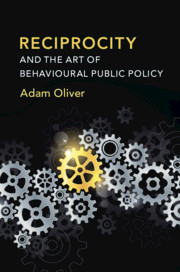Book contents
- Reciprocity and the Art of Behavioural Public Policy
- Reciprocity and the Art of Behavioural Public Policy
- Copyright page
- About the author
- Dedication
- Contents
- Figures and Tables
- Preface
- Acknowledgements
- 1 Setting the Scene
- 2 Animals and Infants
- 3 A Pinch of Anthropology
- 4 A Dash of Behavioural Economics
- 5 The Domain of Reciprocity
- 6 The Dark Side of Reciprocity
- 7 Nurturing Reciprocity in Public Policy
- 8 Reciprocity-Informed Policy Design
- 9 Towards a Political Economy of Behavioural Public Policy
- 10 Summing Up
- References
- Index
1 - Setting the Scene
Published online by Cambridge University Press: 06 July 2019
- Reciprocity and the Art of Behavioural Public Policy
- Reciprocity and the Art of Behavioural Public Policy
- Copyright page
- About the author
- Dedication
- Contents
- Figures and Tables
- Preface
- Acknowledgements
- 1 Setting the Scene
- 2 Animals and Infants
- 3 A Pinch of Anthropology
- 4 A Dash of Behavioural Economics
- 5 The Domain of Reciprocity
- 6 The Dark Side of Reciprocity
- 7 Nurturing Reciprocity in Public Policy
- 8 Reciprocity-Informed Policy Design
- 9 Towards a Political Economy of Behavioural Public Policy
- 10 Summing Up
- References
- Index
Summary
This chapter focusses principally on considering the different forms of reciprocity, driven variously by purported fairness, liking and/or enlightened self-interest. Reciprocity can be direct (i.e. where exchange partners are known to each other), indirect (i.e. where they are not) and negative (i.e. punishment for transgressions), and there is in general a concern both for the intentions of others and for the final distribution of outcomes. Reciprocity can be all of these things because its expression is contextual – the meaning that people attach to the way the context is framed drives behavioural responses, and if care is not taken reciprocity can be crowded out for what many may perceive as our baser instincts. The contextual nature of reciprocity is illustrated in the chapter with reference to a simple economic abstraction known as the ultimatum game. Ultimately, however, in an evolutionary sense perhaps the most fundamental reason for acting reciprocally is that it can bring about benefits and protection to the group, and most people perhaps know innately that what is good for the group is good for them individually, also.
Keywords
Information
- Type
- Chapter
- Information
- Reciprocity and the Art of Behavioural Public Policy , pp. 1 - 18Publisher: Cambridge University PressPrint publication year: 2019
